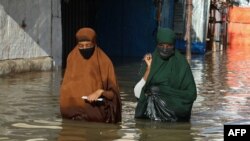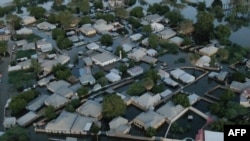Around 200,000 people have been displaced due to flash flooding in central Somalia, a regional official told AFP Saturday, as the Shabelle River burst its banks and submerged roads.
Inhabitants of Beledweyne town in the Hiran region were forced out of their homes as heavy rainfall caused water levels to rise sharply, with residents carrying their belongings on top of their heads as they waded through flooded streets in search of refuge.
"Some 200,000 people are now displaced due to the Shabelle River flash floods in Beledweyne town and the number may increase any time. It is a preliminary figure now," said Ali Osman Hussein, deputy governor for social affairs in the Hiran region.
"We are doing all we can to help those who are affected," he told AFP.
The region's deputy governor Hassan Ibrahim Abdulle said Friday that three people were killed by the floods.
The disaster comes on the heels of a record drought that has left millions of Somalis on the brink of famine, with the troubled nation also battling an Islamist insurgency for decades.
Residents told AFP they were forced to abandon their homes in the middle of the night earlier this week as water gushed through the streets and into buildings.
Fartun Ali — not her real name — said it was her fifth time fleeing flash flooding in Beledweyne.
"Whenever the river breaks the banks, we flee," the 35-year-old mother of eight told AFP.
No time to pack
Another resident, Iman Badal Omar, said he was relieved to escape with his life.
"All we could do was to evacuate and save our children. We did not take any of our belongings," he told AFP.
East and central Africa suffer from extreme weather during the rainy seasons.
Earlier this month, 135 people were killed and more than 9,000 left homeless after heavy rains lashed Rwanda, triggering floods and landslides in several parts of the hilly nation.
More than 400 people lost their lives due to torrential downpours, floods and landslides last week in the eastern Democratic Republic of Congo.
Intensity due to climate change
Experts say extreme weather events are happening with increased frequency and intensity due to climate change — and Africa, which contributes the least to global warming, is bearing the brunt.
In May 2020, at least 65 people died in Rwanda as heavy rains pounded the region, while at least 194 deaths were reported in Kenya.
At the end of 2019, at least 265 people died and tens of thousands were displaced during two months of relentless rainfall in several countries in East Africa.
The extreme downpours affected close to 2 million people and washed away tens of thousands of livestock in Burundi, Djibouti, Ethiopia, Kenya, Somalia, South Sudan, Tanzania and Uganda.





